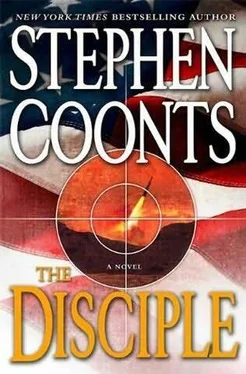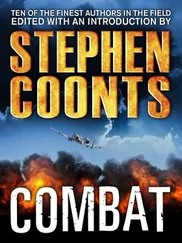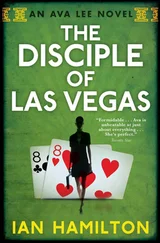Stephen Coonts - The Disciple
Здесь есть возможность читать онлайн «Stephen Coonts - The Disciple» весь текст электронной книги совершенно бесплатно (целиком полную версию без сокращений). В некоторых случаях можно слушать аудио, скачать через торрент в формате fb2 и присутствует краткое содержание. Жанр: Триллер, на английском языке. Описание произведения, (предисловие) а так же отзывы посетителей доступны на портале библиотеки ЛибКат.
- Название:The Disciple
- Автор:
- Жанр:
- Год:неизвестен
- ISBN:нет данных
- Рейтинг книги:4 / 5. Голосов: 1
-
Избранное:Добавить в избранное
- Отзывы:
-
Ваша оценка:
- 80
- 1
- 2
- 3
- 4
- 5
The Disciple: краткое содержание, описание и аннотация
Предлагаем к чтению аннотацию, описание, краткое содержание или предисловие (зависит от того, что написал сам автор книги «The Disciple»). Если вы не нашли необходимую информацию о книге — напишите в комментариях, мы постараемся отыскать её.
The Disciple — читать онлайн бесплатно полную книгу (весь текст) целиком
Ниже представлен текст книги, разбитый по страницам. Система сохранения места последней прочитанной страницы, позволяет с удобством читать онлайн бесплатно книгу «The Disciple», без необходимости каждый раз заново искать на чём Вы остановились. Поставьте закладку, и сможете в любой момент перейти на страницу, на которой закончили чтение.
Интервал:
Закладка:
Life isn’t rational.
He grinned at me, displaying yellow, broken teeth. No dentist had ever seen the inside of his mouth.
“Check back in two weeks,” I said. “Bring your passport.”
Qomi couldn’t believe his good fortune. He dropped the crutch. He reached for my hand to pump it, then realized he didn’t have the visa yet.
“Two weeks,” I repeated.
He got up and arranged the crutch, then pegged off up the stairs. As the grandmother sobbed, I got busy writing up the reasons why the United States of America should give a tourist visa to one Abdullaziz Nasr Qomi. “Mr. Qomi has an incredible love for his native Iran-the land, the people, the culture, the whole enchilada-and he loathes America. His family had to beg him to visit his brother, a concrete finisher in the bowels of Queens who is in poor health, and his brother’s family, including a daughter who plans to marry during Qomi’s visit. I have absolutely no doubt Mr. Qomi will return to the bosom of his extended family in and around”-I had to check for the name of his village, which I inserted here-“prior to the expiration of his visitor’s visa.”
I looked at my screed. One big lie, but… ho-hum. The United States was certainly big enough to swallow Mr. Qomi whole.
I signed my name with a flourish as Frank Caldwell finished with the sobbing grandmother who wanted to go to America. The answer, of course, was no. She was going to die here in Iran, in the third-world squalor of the Islamic Republic, and by God that was that.
As the black chador disappeared up the stairs, Caldwell said to me in an accusatory tone, “I thought I heard you tell that last man that you would recommend him for a visa?”
“Yep.”
“You can’t do that! You’ve read the directives from-”
“I made the recommendation. State can grant it or not, as they choose.”
“You know that guy won’t come home.”
“If we’ve got room for thirteen million illegal Mexicans, what’s the big deal about one one-legged Iranian?” I dropped the visa app in the tray.
“Goddamn it, Carmellini. You can’t give State the finger-”
“You oughta try it sometime, Frank. It’ll make you feel better. Almost human.”
“Carmellini-”
“Why do you do this, Frank? Why sit here day after day, month after month, year after year, looking at the human parade and always saying no? Why don’t you go get a real job and a life?”
“Because-”
“Why?”
“I like these people. Don’t you?”
I pushed the heels of my hands against my eyes until I saw stars.
“Am I the only sane man left alive?” I asked aloud.
After a last glance at Frank, who was still staring at me, I pushed the button to flash the light upstairs, summoning my next victim.
CHAPTER FOUR
The evening after he returned from Israel, Jake and Callie Grafton entertained one of Callie’s faculty colleagues from Georgetown University, where she taught in the language department. Professor Aurang Azari and his wife were Iranians. A year or so after the fall of the shah, he and his wife had left Iran to study in England. They had met and married at Oxford, and upon graduation, he scored a teaching position there. Four years ago he secured a position in the mathematics department at Georgetown.
Azari was of medium size, in his early fifties, Jake knew, and was not a man who would stand out in a crowd. His wife was much like him in size and demeanor, almost a female twin.
In the last few years, Professor Azari had become an authority on Iran’s nuclear program. Regularly quoted in the press, he also did op-ed pieces for the big newspapers and had even written a book about Iran’s nuclear program. None of this would be possible, of course, without a private intelligence network inside Iran, a network made up of enemies of the regime.
The CIA had attempted to recruit the professor several times and had been rebuffed each time. Grafton thought that Azari and his friends had probably belonged to the Mojahedin-e Khalq, the People’s Holy Warriors, who first supported Khomeini and the mullahs, then became their enemies. The MEK attracted Marxists, intellectuals and the educated, all of whom the fundamentalists feared. Stealing a page from Lenin, after the Islamic Revolution Khomeini and his disciples arrested, tortured, interrogated and executed many of their political enemies. Some of the survivors, who were scientists and technicians, were recruited into Iran’s nuclear program. They-Grafton thought-were probably Azari’s sources, his spies.
Foreign intelligence services, including the CIA, are usually bottom feeders, vacuuming up the gossip of laborers and low-level functionaries. Azari’s sources delivered gold. That their reports got from Iran to Azari said a lot about the inefficiency of the Islamic Revolutionary Guard security service. Any large classified program had leaks, but Iran’s was a sieve. Still, the CIA had had no success generating the kind of intelligence that Azari obviously had access to.
Naturally, Azari knew about the Israeli attack on the Syrian reactor, even though not a word about it had appeared in the Washington or New York newspapers.
“What do they think about that in Iran?” Jake asked innocently at the dinner table.
“They’re worried men,” Azari said. “They might be next, and they know it.”
“One would suspect so,” Grafton replied thoughtfully.
When it became obvious that was Azari’s only comment, Callie asked her guests what they thought of fundamental Islam. “I know you are both Muslims,” she said, “but I am curious, as I know most Americans are. Are the fundamentalists representative of the Islamic mainstream? What do you think?”
Mrs. Azari deferred to her husband, as apparently she always did. He said, “Fundamentalist Islam is the last gasp of a traditional way of life that is rapidly dying. One writer, Edward Shirley, called the Islamic Revolution in Iran ‘a male scream against the gradual, irreversible liberation of women and the Westernization of the Muslim home.’ He was right.”
Later, after dinner, Jake asked the professor to come to his study. He shut the door behind them and said, “I don’t want to insult you, but would you like a drink?”
A guilty look flitted across the professor’s face. “A little wine would be welcome,” he admitted. “I developed a taste for it in England.”
Jake removed a bottle of French wine from a cabinet and handed it to Azari, who inspected the bottle and approved. When both men were seated and sipping on a glass of wine, Grafton said, “I work for the American government, Professor, and I want to take this opportunity to ask you for your help.”
The professor was taken aback. “What branch?” he asked abruptly.
“Intelligence,” Grafton said. “CIA.”
“Your agency has approached me before. I told your Mr. Spadafore-”
“I’m aware of that,” Grafton said. He removed a sheet of paper from a desk drawer and passed it to the professor, who put on his glasses and scrutinized it.
“You recognize those numbers, of course,” Jake said.
Azari said nothing, merely sat holding the paper in his hands.
“Those are the prime numbers that you and your Iranian contact use for your encryption code,” Jake said. “We have been reading every message your contact sends you about the Iranian nuclear program for years. All of them. As you know, they are encrypted and buried in large photo files.”
“We?”
“The National Security Agency. NSA.” Jake took a sip of wine. “If we can read them, one wonders if the Iranians can.”
“They can’t,” Azari said and placed the paper on Jake’s desk. Grafton reached for it, put it back in the drawer and closed the drawer.
Читать дальшеИнтервал:
Закладка:
Похожие книги на «The Disciple»
Представляем Вашему вниманию похожие книги на «The Disciple» списком для выбора. Мы отобрали схожую по названию и смыслу литературу в надежде предоставить читателям больше вариантов отыскать новые, интересные, ещё непрочитанные произведения.
Обсуждение, отзывы о книге «The Disciple» и просто собственные мнения читателей. Оставьте ваши комментарии, напишите, что Вы думаете о произведении, его смысле или главных героях. Укажите что конкретно понравилось, а что нет, и почему Вы так считаете.












